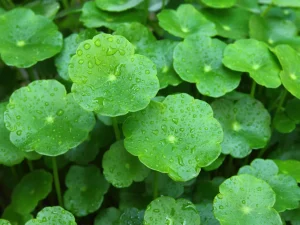
A new pilot study at Oregon Health & Science University (OHSU) in Portland, OR is examining whether a botanical supplement can improve memory and delay symptoms of dementia.
OHSU is recruiting people aged 65 to 85 who have been diagnosed with mild Alzheimer’s disease or cognitive impairment. The study uses a carefully formulated extract of Gotu kola (Centella asiatica), an herb used primarily as traditional medicine and cuisine in India, Sri Lanka, China and Indonesia.

This will be the first clinical study to test a botanical used in dietary supplements since the OHSU Botanical Dietary Supplements Research Center opened in 2020.
“The whole idea of the center is to build up the kind of preclinical information you need to do good clinical trials on botanicals that are used in dietary supplements,” said Amala Soumyanath, PhD, center director and a professor of neurology at OHSU’s School of Medicine. “With Centella we’re at that point.”
OHSU conducted preclinical experiments and early human studies in collaboration with Oregon State University (Corvallis, OR) and herbal supplement manufacturer Oregon’s Wild Harvest (Redmond, OR). This included formulating the specific dosages of Gotu kola and and testing it in mice, OHSU said.
According to researchers, he study will test whether drinking Gotu kola extract for six weeks will change biomarkers in the blood and brain associated with cognitive health. The study will include 48 participants with half given the botanical and half given a placebo. Participants will undergo blood draws and brain MRI scans throughout, researchers said.
“The goal is to see whether this herb does something in the body that’s related to memory,” said Alex Speers, ND, clinical trial coordinator and an assistant professor of neurology at OHSU’s School of Medicine. “We’re not going to be able to show that it improves memory in this pilot study.”
If the pilot study demonstrates statistically significant results, researchers plan to expand to a larger clinical trial with hundreds of participants over several months. This research could lead to a more effective botanical treatments for memory loss and cognitive issues, OHSU said.
“It might lead to manufacturers making better botanical products similar to this,” Soumyanath said. “Because we know precisely what’s in here, they might even be able to standardize production with the active compounds.”
For more information, visit this link.

A new pilot study at Oregon Health & Science University (OHSU) in Portland, OR is examining whether a botanical supplement can improve memory and delay symptoms of dementia.
OHSU is recruiting people aged 65 to 85 who have been diagnosed with mild Alzheimer’s disease or cognitive impairment. The study uses a carefully formulated extract of Gotu kola (Centella asiatica), an herb used primarily as traditional medicine and cuisine in India, Sri Lanka, China and Indonesia.
This will be the first clinical study to test a botanical used in dietary supplements since the OHSU Botanical Dietary Supplements Research Center opened in 2020.
“The whole idea of the center is to build up the kind of preclinical information you need to do good clinical trials on botanicals that are used in dietary supplements,” said Amala Soumyanath, PhD, center director and a professor of neurology at OHSU’s School of Medicine. “With Centella we’re at that point.”
OHSU conducted preclinical experiments and early human studies in collaboration with Oregon State University (Corvallis, OR) and herbal supplement manufacturer Oregon’s Wild Harvest (Redmond, OR). This included formulating the specific dosages of Gotu kola and and testing it in mice, OHSU said.
According to researchers, he study will test whether drinking Gotu kola extract for six weeks will change biomarkers in the blood and brain associated with cognitive health. The study will include 48 participants with half given the botanical and half given a placebo. Participants will undergo blood draws and brain MRI scans throughout, researchers said.
“The goal is to see whether this herb does something in the body that’s related to memory,” said Alex Speers, ND, clinical trial coordinator and an assistant professor of neurology at OHSU’s School of Medicine. “We’re not going to be able to show that it improves memory in this pilot study.”
If the pilot study demonstrates statistically significant results, researchers plan to expand to a larger clinical trial with hundreds of participants over several months. This research could lead to a more effective botanical treatments for memory loss and cognitive issues, OHSU said.
“It might lead to manufacturers making better botanical products similar to this,” Soumyanath said. “Because we know precisely what’s in here, they might even be able to standardize production with the active compounds.”





